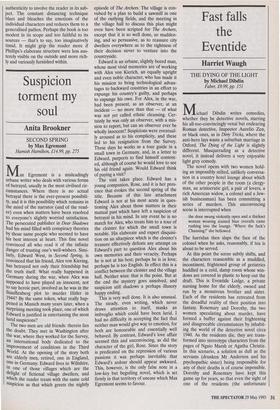Suspicion torment my soul
Anita Brookner
SECOND SPRING by Max Egremont Hamish Hamilton, £14.99, pp. 275 Max Egremont is a misleadingly urbane writer who deals with various forms of betrayal, usually in the most civilised cir- cumstances. Where there is no actual betrayal there is the ever-present possibili- ty, and it is this possibility which remains in the mind of the narrator (and of the read- er) even when matters have been resolved to everyone's slightly worried satisfaction. The persecuted publisher in Dear Shadows had his mind filled with conspiracy theories by those same people who seemed to have his best interest at heart. This fine novel convinced all who read it of the infinite danger of trusting one's well-wishers. Simi- larly, Edward West, in Second Spring, is convinced that his friend, Alex von Kiering, has betrayed not only their friendship but the truth itself. What really happened in Germany during the war, when Alex was supposed to have played an innocent, not to say heroic part, involved as he was in the Stauffenberg plot to murder Hitler in 1944? By the same token, what really hap- pened in Munich many years later, when a surprising meeting took place, one of which Edward is justified in entertaining the most lurid suspicions?
The two men are old friends: therein lies the doubt. They met in Washington after the war, where they worked for the Survey, an international body dedicated to the improvement of conditions in the Third World. At the opening of the story both are elderly men, retired, one in England, one in Germany. Edward lives in Wiltshire, in one of those villages which are the delight of fictional village dwellers, and which the reader treats with the same cold suspicion as that which greets the nightly episode of The Archers. The village is con- vulsed by a plan to build a sawmill in one of the outlying fields, and the meeting in the village hall to discuss this plan might even have been scripted for The Archers, except that it is so well done, so madden- ing, and so persuasive, as to reassure city dwellers everywhere as to the rightness of their decision never to venture into the countryside.
Edward is an urbane, slightly bored man, whose most vivid memories are of working with Alex von Kierich, an equally upright and even noble character, who has made it his mission to bring technological advan- tages to backward countries in an effort to expunge his country's guilty, and perhaps to expunge his own. For Alex, in the war, had been present, as an observer, at an incident — no more than that — of what was not yet called ethnic cleansing. Cer- tainly he was only an observer, with a mis- sion to report, but can an observer ever be wholly innocent? Suspicions were eventual- ly aroused as to his complicity, and these led to his resignation from the Survey. These days he works as a tour guide in a small town in Germany, and, in a letter to Edward, purports to find himself content- ed, although of course he would love to see his old friend again. Would Edward think of paying a visit? The visit takes place. Edward has a young companion, Rose, and it is her pres- ence that evokes the second spring of the title. Because of this late attachment Edward is not at his most acute in ques- tioning Alex about those matters in their mutual past which have left a suspicion of betrayal in his mind. In any event he is no match for Alex, who treats him to a tour of the cloister for which the small town is notable. His elaborate and expert disquisi- tion on an altarpiece which is the cloister's treasure effectively defeats any attempt on Edward's part to question Alex about his own memories and their veracity. Perhaps he is not at his best; perhaps he is in love; perhaps he is too English. In effect this is a conflict between the cloister and the village hall. Neither wins: that is the point. But at the end the mystery goes unsolved, and suspicion still shadows a perhaps illusory happy ending. This is very well done. It is also unusual. The steady, even writing, which never draws attention to itself, masks an imbroglio which could have been lurid. I had no difficulty in accepting the fact that neither man would give way to emotion, for both are honourable and essentially well behaved. By contrast, Edward's love affair seemed thin and unconvincing, as did the character of the girl, Rose. Since the story is predicated on the repression of various passions it was perhaps inevitable that Edward's ardour should appear awkward. This, however, is the only false note in a low-key but beguiling novel, which is set firmly in that territory of unease which Max Egremont seems to favour.


















































 Previous page
Previous page